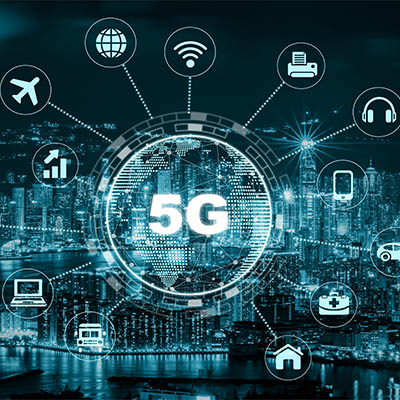How Will the IoT Be Shaped by 5G Connectivity?
If there’s any technology that has received hype in recent months, 5G connectivity has to at least be a contender for the most anticipated. The fifth generation of wireless connectivity is staged to benefit society and business alike through improved automation—particularly with the concurrent growth of the Internet of Things helping to develop the next iteration of the economy. Let’s consider how 5G is shaping up, and the impacts that it will likely have in the future.
How 5G Began the Year
While we’ve been hearing about the purported miracles that 5G will be capable of for some time now, it wasn’t until 2020 that we saw actual action taken by telecom providers. These 5G connections offered a few impactful benefits:
- Lower latency – 5G connectivity promises to basically eliminate the latency issues people have with their wireless cellular applications.
- Increased rates – With a 5G connection, faster wireless speeds allow data to be transmitted, providing users with content quicker.
- Enhanced capacity – As 5G grows in popularity, more devices will be able to be connected, meaning more can be done.
Of course, as with every other upgrade made to as significant an infrastructure as that which supports our cellular networks, things won’t change overnight. There will need to be some time spent, both on assembling the new infrastructures necessary and introducing devices that support 5G connectivity.
How Will 5G Impact the Internet of Things?
Along with the development of 5G, the Internet of Things has seen stupendous growth, with an estimated 26 billion IoT devices existing in 2020. Once the aforementioned improvements made with 5G connectivity become fully mainstream, businesses will have the option to do so much more involving the IoT. Let’s consider a few ways the IoT will likely see expanded usage:
- Manufacturing – Perhaps no other industry will see gains of the same significance that manufacturers will. A low-latency, high-speed connection means that business can happen in virtual real time, with massive amounts of data processed and rendered to make decision-making simpler and a more dynamic process and making quality control, procurement, distribution, and customer relationship management all far better as smart technology actively tracks and reports data at remarkable speed.
- Supply chain – Traditionally, supply chain management has required a lot of oversight. IoT has been slowly deployed to make this process more efficient, something that 5G connectivity and issue reporting capabilities that today’s smart devices have will use to improve business’ ability to manage their supply chain effectively.
- Municipal – Municipal services are seeing greater amounts of automation thanks to the implementation of 5G. It is becoming more likely that we will begin to see “smart cities” developed where essential utilities such as water, sewer, traffic, and electricity are all managed through the use of IoT devices that modulate the need for changes to these systems with very little human oversight, potentially saving taxpayers considerable capital.
- Autonomous vehicles – Self-driving cars and trucks are one of the more pronounced benefits that the IoT could offer via 5G connectivity. While a process like this takes a lot of data to implement safely, 5G and its high speeds and low latencies could finally make it practicable.
- Healthcare – Finally, it’s been predicted that 5G will make healthcare far more efficient by better handling the enormous amount of data that is sent and received. Once the speeds attainable by this network are utilized en masse, patient data will be more readily available to the medical professionals who need it.
The intersection of 5G and the Internet of Things certainly seems to hold great promise, but time will only tell what ultimately comes of it. Whatever the future may have in store, you could rest confidently knowing that ResolveIT is taking care of your business’ technology. Reach out to us to discuss how your operations could be optimized.



